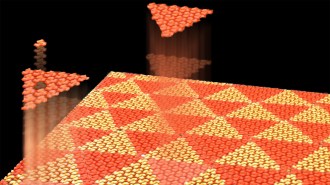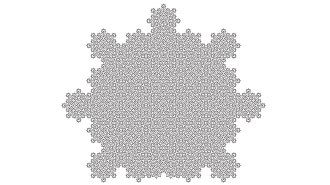Million-dollar math prize awarded, but not necessarily accepted
The reclusive mathematician who proved the Poincaré conjecture may or may not claim his prize
- More than 2 years ago
The Clay Mathematics Institute announced March 18 that it is awarding its first Millennium Prize, this one for the resolution of the Poincaré conjecture, to Grigoriy Perelman, formerly of the Steklov Institute of Mathematics of the Russian Academy of Sciences in St. Petersburg.
Perelman first announced his proof of the conjecture in 2002, publishing a sketch of his result over the following months online. Dozens of mathematicians labored for several years to fill in the details of his proof and verify its validity, finally presenting the proof in several different book-length manuscripts.
But Perelman may or may not accept the award — or the million dollars that go with it. In 2006, Perelman was awarded the Fields Medal, often considered mathematics’ version of a Nobel Prize. Perelman declined the honor, having become estranged from the mathematics community. Perelman is now pondering whether he will accept the Millennium Prize, according to the institute’s president, James Carlson, who notified Perelman of the award.
The Poincaré conjecture was one of the giant unsolved problems in mathematics, alternately seducing and taunting mathematicians for 99 years by the time Perelman published a third paper sketching his proof. The question is perhaps the most fundamental one about spaces having more dimensions than the three we’re used to: What are the simplest objects in four dimensions?
The conjecture claims there’s one simplest object in four mathematical dimensions: the sphere. To a topologist (the kind of mathematician who studies the Poincaré conjecture), a “simple” object is one with no edges, no holes and no twists. And a topologist considers two objects to be the same if you can squish one into the shape of the other without punching any holes or gluing anything together. So, for example, an egg and a sphere are, to a topologist, the same object.
Mathematicians were able to show long ago that no other object in three dimensions is as simple as the sphere. And oddly enough, mathematicians more than two decades ago were able to prove the same thing for spaces with dimensions higher than four, because the extra dimensions give more “wiggle room.” But the result in four dimensions was so difficult that no one had expected the problem to be solved anytime soon.
Stunningly, Perelman did even more than just prove the Poincaré conjecture. He also found the “atoms” that constitute any object in four dimensions.
In particular, he proved William Thurston’s “geometrization conjecture.” Thurston, a mathematician at Cornell University, developed the idea in 1982 that every four-dimensional object could be created by gluing together eight different types of basic shapes. Thurston couldn’t prove it, but mathematicians quickly recognized that he was probably right. Of course, because his conjecture implied the Poincaré conjecture, mathematicians also recognized that the proof was going to be extraordinarily difficult to find.
“No one thought even Poincaré’s conjecture was going to fall, much less geometrization,” Carlson says. “It’s as if you were fishing for tuna and you got a whale.”
At the turn of the millennium, the Clay Mathematics Institute established million-dollar prizes for the solution of seven of the most difficult problems in mathematics, including the Poincaré conjecture. The institute’s rules require that it waits two years after the result has been published in a refereed journal before awarding the prize, in order to give the mathematical community time to find any errors. Perelman himself never submitted his articles to a refereed journal, posting them online only.
The Institute began the two-year clock when expositions of Perelman’s proof were published by others, including one by Bruce Kleiner of New York University and John Lott of the University of California, Berkeley; another by John Morgan of Columbia University in New York and Gang Tian of MIT; and a third by Huai-Dong Cao of Lehigh University in Bethlehem, Penn., and Xi-Ping Zhu of Harvard University.
Regardless of whether Perelman accepts his prize money, the institute will hold a conference June 8 and 9 in Paris to celebrate his achievement.
After Perelman published his third online paper in 2003 outlining his result, he retreated from the mathematical community. He declined job offers from around the world and resigned his post at the Steklov Institute in 2005. He is reported to live with his mother in St. Petersburg and to no longer consider himself a professional mathematician.






